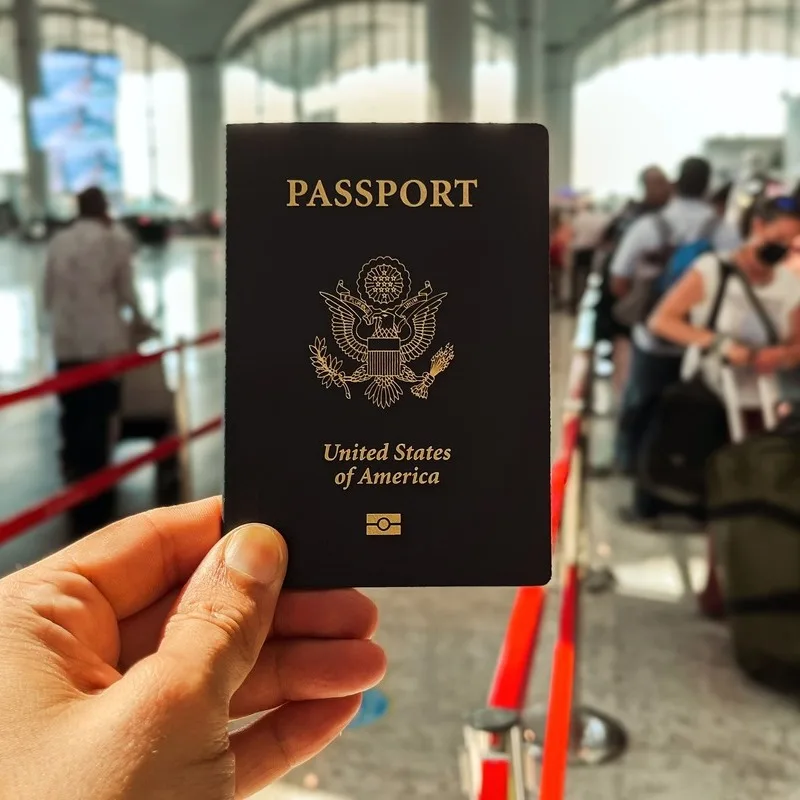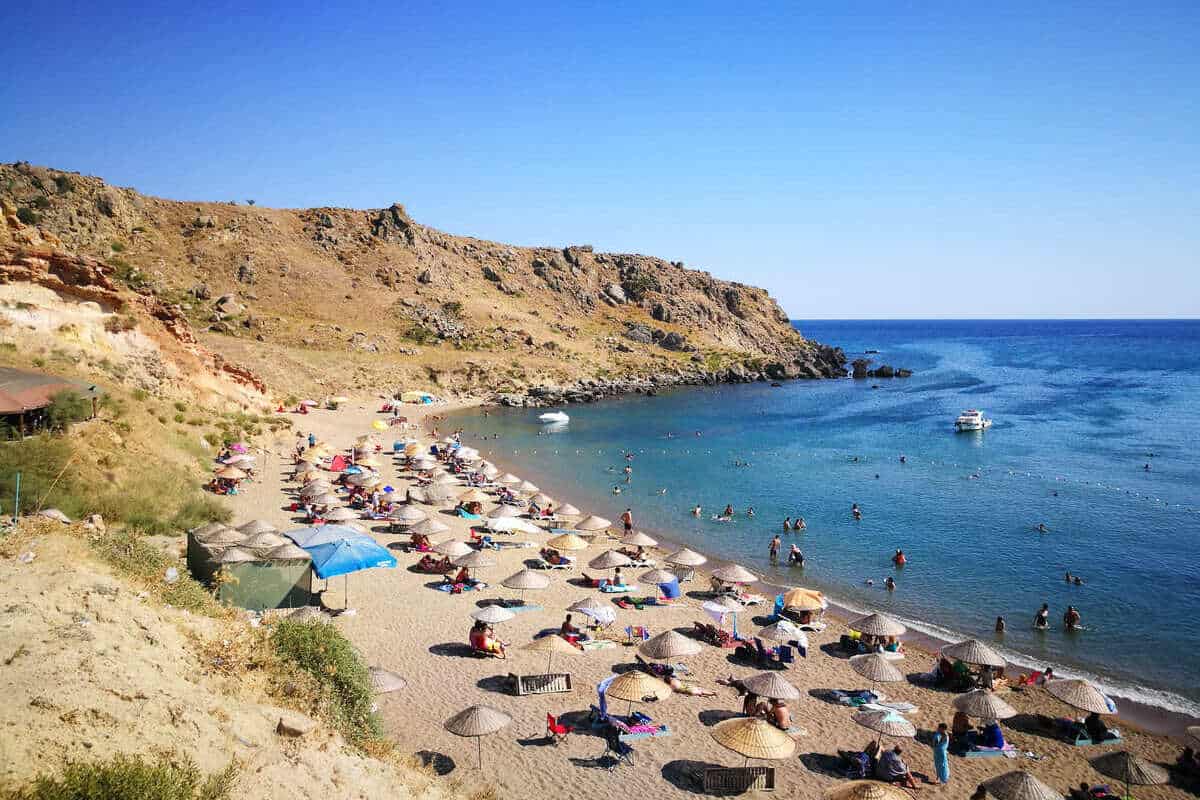The Mediterranean is the trendiest destination for travelers this season. Having attained fame due to its marvelous coastal areas, ancient cities, and laid-back atmosphere, it is set to host a record number of guests over the balmy summer months.
One major downside? It’s gonna be more crowded than ever before.
Even the basin’s lesser-known spots, namely Albania, a former hidden gem of the Balkans, and the Eastern Mediterranean nation of Cyprus, are expecting a surge in tourist arrivals, and if you’re looking for unruffled beaches and no crowds, your options are narrowing by the minute.
Luckily, not all of the ‘Med’ has been ruined by the masses, as this unknown island has only a limited number of tourists, and it remains a great budget destination:
A Greek Island That Is Now Part Of Türkiye
Welcome to Gökçeada, or Imbros as it was originally called, the largest island off the mainland coast of Türkiye (formerly called Turkey).

Recently awarded the title of the world’s first and only ‘Cittaslow‘ offshore destination, the ‘Heavenly Island’ has begun gaining traction in recent months as a cheaper, unspoiled alternative to the overcrowded island getaways of Santorini, Mykonos, and the like.
Cittaslow is a designation bestowed by a renowned Italian organization upon destinations that enjoy a distinct ‘slow-paced’ lifestyle, positively impacting the quality of life of the locals, and notorious for their idyllic features.
Full Cittaslow members must have a population of less than 50,000 inhabitants – a criteria Gökçeada meets, as it is home to just over 10,000 islanders – and they are traditionally not overtaken by major developers or globalization trends.

In other words, this is the only Mediterranean island to be certified ‘peaceful enough’, amid the boom in tourism across the basin.
Why Is Gökçeada Still Largely Unknown To The Masses?
Boasting a rich history encompassing at least two millennia, Gökçeada/Imbros was originally settled by ethnic Hellenes, or Greeks, and it remained very much faithful to its Greek origins until the early 20th century.
Back then, the Greek-speaking locals were forced to flee as part of the re-drawing of borders and a population swap between Greece and Türkiye. From 1923 onward, the administration of the island was passed to the latter, and new settlers from mainland Türkiye arrived.

Despite the drastic change in demographic, Gökçeada remains, at its core, a ‘Greek’ island, and one that hasn’t been tarnished by over-tourism, as all of its Aegean neighbors that ended up under Greek administration, as opposed to Turkish, have.
A Mystical Island
It is an island that, in Ancient Times, was associated with Homer’s epic poems, most notably Iliad, as the probable location of Poseidon’s winged horses’ stables, and alongside its sister island of Tenedos, also part of Türkiye in the present-day (renamed Bozcaada), were sacred to Ancient Greeks.
According to mythology, they were linked to Hephaestus, god of metallurgy, a long-forgotten deity that features on several coins found around Gökçeada.

Besides its obvious cultural appeal and fascinating History, the island is known for being less developed than other islands in the vicinity that are part of Greece and for being a window into what a Hellenic Aegean island would have looked like prior to the advent of tourism.
Tourist-Free
Its ‘capital’ – officially the administrative seat – is the small Gökçeada Town, historically called Panagia, a cobbled village with a limited offer of tourist accommodation that has maintained its original character – that of an undisturbed fishing community.

It feels very rustic when sided with other Aegean island towns, especially the port in Samos, Chios Town, and Limnos, but that’s where its beauty lies.
Unlike the Greek islands that were reclaimed by Greece all those decades ago, Gökçeada did not put tourism at the front of its long-term development plan.
That’s not to say that the island (as a whole) has a lacking tourist offer.
A Vast Tourist Offer
From marine parks to golden sand beaches lapped by turquoise waters and tiny cobbled villages frozen in time, you will fall in love with this unheard-of Mediterranean treasure, and the best thing is: wherever you’re staying on the island, you’ll either be within short walking or driving distance of many of its landmarks, as it is not that big.

For a taste of Imbros, Gökçeada’s former Greek identity, head to the charming settlements of Bademli and Zeytinliköy, perched higher up in the hills and commanding fantastic panoramas of the island.
These villages are known for their distinct Greek character, with solitary, ruined Greek Orthodox churches that have survived the Turkish takeover and centuries-old stone houses with doors that are painted Greece’s signature blue but with exteriors that lack the ‘whitewash’ makeover trend that dominated other Aegean islands in the 20th-century.
Truly Unruffled Beaches
Looking for crowd-free beaches?

Whether it’s the high or low season, beaches on the island are never too busy, and though you should expect a certain influx of Turkish families, mostly holidaymakers from the Anatolian mainland, to make landfall in the summer months, this is nowhere near the crazy levels of tourism seen in the Cyclades or the Ionian Sea.
The most beautiful, untouched sandy crescents in Gökçeada are:
- Gizli Liman Plaji, bounded by a dense forest, and said to be the perfect romantic spot for watching the blood orange-tinged sunsets over the Aegean;
- Aydincik Beach, next to a salt lake, where the mud is believed to have healing qualities;
- Laz, a quieter, more remote bay most easily accessed by car;
- Yildiz Koy Plaji, one of the best-developed beaches on the island.

Yildiz Koy has a parking lot drivers can use for roughly 5 Turkish lira, equivalent to only a few cents, and beach umbrellas to rent to keep you shaded from the scorching sun.
Bonus tip: if you wanna watch a flamboyance of flamingos, make sure you head to Aydincik, as it is a popular migration route for them.
Cheaper Than Most Aegean Islands
As the Turkish lira is the official currency in Gökçeada, it can be a lot cheaper than ‘Euroized’ islands due to the lira’s weakness against the dollar and the country’s current economic turmoils.

The largest city in the North Aegean province of Türkiye is Çanakkale, on the mainland, where you are likely to pass through on your way to Gökçeada.
In Çanakkale, a meal for two people at a mid-range restaurant is estimated at US$9.02, while inexpensive restaurants can be as cheap as US$2.30, as reported by Numbeo.
On the island, there are fewer eateries available and not a huge variety of dining options. Hence, prices may be higher than in the mainland, but the cost of living in Çanakkale is generally a good indication of prices in the wider North Aegean.

As for accommodation, Gökçeada may not be a major tourist island, but it has no shortage of accommodation to pick from, from upscale, family-run B&Bs, to traditional three-star hotels.
A majority of the hotels and guesthouses are located in the main town, and they can be pricier than the mainland, but when compared to the Greek islands, particularly Santorini, it’s great value for money.
Nightly rates for an entire holiday home in August start at US$94, going as high as US$148 for the Gokceada Surf Egitim Merkezi mini-resort.
How To Get To Gökçeada
Part of the reason why Gökçeada has not been tarnished by mass tourism is because it is not the easiest Mediterranean island to reach.

It does have an airport, but it does not seem to be currently in operation, as there are no regular scheduled flights other than a handful of private, chartered flights, and the easiest way to get there is still taking the ferry from mainland Türkiye.
The main port of departure is Kabatepe, as it is the only ferry connection that can accommodate cars. From Kabatepe, the boat travels a short distance of 15 miles before calling at Gökçeada, for a total duration of 90 minutes.
Flying To Çanakkale

The nearest major airport to Kabatepe is located in Çanakkale, the famous gateway to the historical ruins of Troy. They host flights from two of Türkiye’s largest cities: Istanbul, the country’s busiest hub, and the capital of Ankara.
More often than not, tourists with their hearts set on exploring these under-visited islands will find themselves taking the bus route from Istanbul, the only Turkish city with Transatlantic connections – and an ever-expanding list of them, at that.
Buses To Çanakkale

Çanakkale-bound low-cost buses leave every day from several stations in Istanbul and the wider province, as cheap as US$8.22 when booked through major booking platforms like Flixbus. The journey takes on average 4 hours.
From Çanakkale, tourists must then use local public transportation – a ferry and a bus – or arrange a private transfer to take them to the ferry/’feribot’ in Kabatepe, as it is still 1h44 away from the city.
As you can see, not the easiest Mediterranean island to get to, but certainly one of the most rewarding when you take into account not that many tourists are traveling on this route, or have even heard of Gökçeada, in the first place.
Other Tips For Visiting Gökçeada

When visiting Gökçeada, visitors must bear in mind some locations may be easier to find under the island’s former Greek place names, as they are more commonly known outside Türkiye.
They are advised to do their own research on the island’s complex History and familiarize themselves with the decades-long disputes and animosity between Greek and Turkish communities living in the Aegean.
It may be difficult to travel to other islands in the area, even though they’re very close and visible to the naked eye, as they are in Greece, and ferry connections are limited.

Americans can stay in Türkiye for up to three months as tourists, but they are reminded they are required to apply for an e-Visa in advance, at the cost of US$50. The same applies to Canadian travelers, but not Europeans or British nationals, who are visa-exempt.
Some European nationals are in fact eligible to travel to Türkiye without passports, carrying only their national ID, though they are advised to check nationality-based entry requirements in advance.

